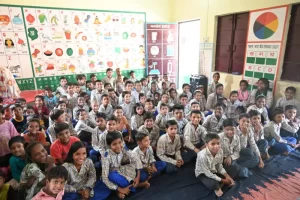- info@satyashaktifoundation.org
- Mon - Sat: 09.30 AM - 06:30 PM
A Step Towards Inclusive Education By NEP
As per the new education policy, India is committed to providing inclusive education to all children. This means that all children, regardless of their abilities or disabilities, will have access to quality education. The policy also recognizes the importance of catering to the individual needs of each child, also ensuring that they are able to reach their full potential. In order to achieve this, the policy emphasizes the need for a more inclusive and diverse education system, which is responsive to the needs of all children.
Every youngster feels secure and welcome in a truly inclusive environment. Students and their parents help to create learning objectives and make decisions that influence them. And school personnel are trained, supported, flexible, and equipped to nurture, encourage, and react to the needs of all pupils.
What is the significance of inclusive education in India?
Inclusive education is important because it helps to ensure that all students have an equal opportunity to learn and succeed in school. It also helps to create a more diverse and accepting environments for all students.
Inclusive systems improve educational quality for all pupils and help to change discriminatory attitudes. Schools offer the setting for a child’s first encounter with the world outside of their family, allowing for the formation of social bonds and interactions. Respect and understanding flourish when students of all abilities and backgrounds play, interact, and study together.
What is the role of NGO in inclusive education?
- NGOs can play an important role in promoting inclusive education and supporting inclusive education initiatives. They can do this through providing information and resources, advocating for inclusive education policies and practices, and working directly with schools and other educational institutions to support inclusive education.
- NGOs have had a substantial impact on the country’s inclusive education expansion in India, as a result of government projects like the Sarva Shiksha Abhiyan, education has become ubiquitous, inspiring several non-governmental organizations to cooperate with them and further the cause.
- Numerous NGOs in Delhi NCR like SATYA Shakti Foundation operate at the local level to improve the educational system and raise awareness of the value of education in a child’s life.
- NGOs that support education are there to stabilise the educational system’s see-saw. It is widely recognized that non-governmental organizations like SATYA Shakti Foundation are essential to the growth of inclusive education for children with disabilities across the world. Access to elementary education, however, continues to be a significant problem for many people worldwide.
- Every impoverished child’s education in India requires access to high-quality study materials, an inclusive format, and training practices that are critical for India’s economic and social progress. The provision of infrastructure for education is insufficient unless specific challenges are identified and handled in a systematic manner. An NGO acts as a link between the government and the people. They serve a critical role in providing education to the general public.
- In today’s world, a more inclusive education style including participatory and community-based approaches is preferred, with the government recognising NGOs as a source of innovators and professional resource centers. This contributes to the formation of collaboration in order to achieve a large-scale result.
Initiatives made by the SATYA Shakti Foundation for inclusive education

There is no one-size-fits-all answer to this question, we have taken all the necessary steps to implement inclusive education vary depending on the specific needs of the students and the resources available. However, some general steps that may need to be taken include:
- We have conducted assessments to identify the specific needs of the students who will be included in the program.
- Identifying and training teachers and other staff members who will be working with the students.
- Acquiring the necessary resources and materials to support the students.
- Making a welcome and encouraging atmospheres for all children.
- Respond to individual learning needs by offering enough support and implementing student-centered teaching methods and concepts.
- We strive to provide a Common learning environment, an inclusive setting in which education is provided to children of varying abilities and alongside their peer group in the community school, while being sensitive to their specific learning needs, and is used for the majority of the students.
Conclusion
Subscribe
Subscribe to our newsletter for the latest update.
Contact Us
- DPT 004, Ground Floor, DLF Prime Towers, Block- F, Okhla Phase-1, New Delhi- 110020 India
- +91-011 408 45450
- info@satyashaktifoundation.org
- Mon - Sat: 09.30 AM - 06:30 PM
-
© Copyright 2023 SATYA Shakti Foundation, All Rights Reserved. Developed By Kitoinfocom Pvt Ltd



Leave a Reply